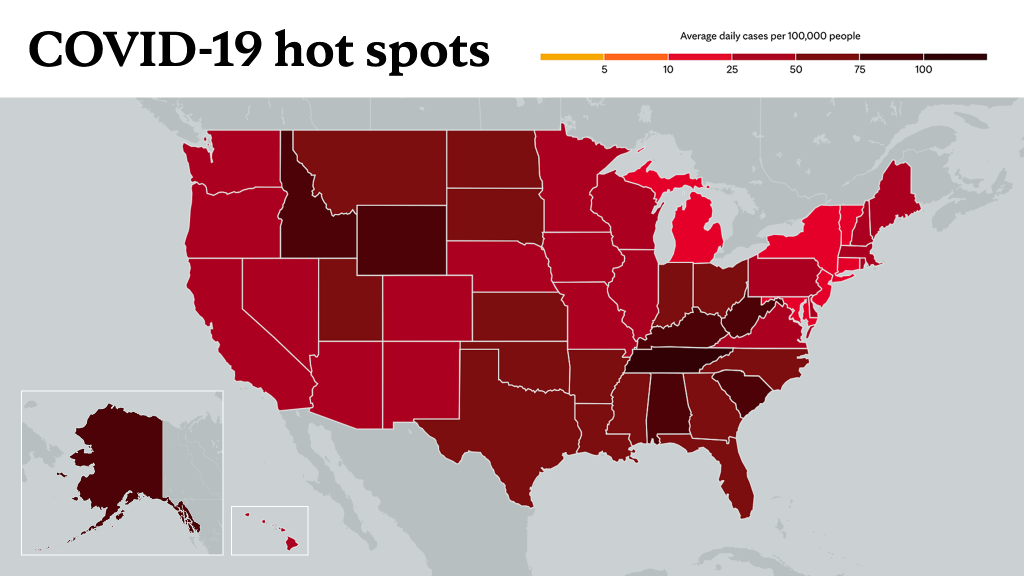-
COVID-19
Mayo Clinic Q and A: COVID-19 vaccine boosters and third doses

DEAR MAYO CLINIC: Both of my parents have been vaccinated for COVID-19. The doctor told my mom she is eligible for a third dose of a COVID-19 vaccine, but my dad is not eligible for a booster now. Can you explain who needs an additional vaccine now, and the differences between a booster and third dose.
ANSWER: It's good to know that your parents are among the millions of people who have been vaccinated for COVID-19. A primary vaccine, such as the one your parents have received, is intended to build an initial immune response.
Although viruses constantly change through mutation, and new variants can occur, such as with the COVID-19 delta variant, vaccination is an important step in the fight against the virus. Being vaccinated for COVID-19 can protect you from becoming infected and possibly infecting those around you, but it also can lessen the severity of illness if you are infected.
The Centers for Disease Control and Prevention (CDC) reported that people 65 and older who have been vaccinated have a significantly reduced risk of hospitalization if they become infected with COVID-19.
As far as the booster shot and the third dose of a COVID-19 vaccine, the main difference is really the purpose of the shot and the status of the person receiving the shot.
The primary vaccination series is intended to build an initial immune response. However, some people need more coverage.
Think of it like painting a house. You sometimes can get good coverage with one coat of paint, but occasionally you might need two or even three coats of paint to get that good coverage. It's the same way with vaccines.
In the case of COVID-19 messenger RNA vaccines, like Moderna and Pfizer, some people might have a great response to one dose. But most people need two doses of these vaccines to get a great response.
We also know that people who are immunocompromised — those whose immune systems aren't working well — often need additional vaccine doses to improve vaccination effectiveness.
In early August, it was recommended that moderately or severely immunocompromised people 12 and older who received the Moderna or Pfizer COVID-19 vaccines receive a third dose at least 28 days after completing the initial series. Immunosuppressed or immunocompromised refers to those who have medical conditions that compromise the immune system, or patients who require treatment with immunosuppressant medications, such as chemotherapy. People with a weakened immune system have a more difficult time fighting off infection than a healthy person.
People who are otherwise healthy, do not have one of the specific conditions, or take certain medications are not eligible for a third dose of a COVID-19 vaccine.
At this time, an additional dose is not recommended for those who received the Johnson & Johnson COVID-19 vaccine.
Over time, though, as with other viruses, immunity may start to wane. And the purpose of a booster vaccine is to be a reminder to the immune system. So, like the paint analogy, you might need another coat of paint down the road when the initial one starts to wear thin or get stains on it. Giving another coat of paint is like giving a booster.
With COVID-19, the immunity people achieved from their initial vaccination has been reduced with respect to the delta variant. That is why there are so-called "breakthrough infections," where people are getting infected with COVID-19 even after being vaccinated for COVID-19.
The good news is that it's primarily waning mostly against mild infection. The incidence is still rare, and typically those cases are mild, as the early vaccine doses are still protecting against severe infection and hospitalization.
But clearly, the delta variant has some resistance to that vaccination, and the goal is to stop the spread of any form of infection. So boosters most likely will be recommended for everyone, and administration of those boosters probably will begin with the same groups who were prioritized for initial vaccinations: health care workers, long-term care residents, seniors and people with high-risk health conditions.
We expect more guidance from the CDC over the coming weeks after more data from studies are available. It is likely that healthy people who received two doses of the Moderna or Pfizer vaccine will be eligible for a booster shot but the exact time frame is not yet known. Right now, boosters will consist of the same formulation as the original vaccine. But that could change over time, too.
Based on current data, side effects from a third dose are similar to what was experienced with a second dose: headache, fatigue, low-grade fever and some muscle aches. And those side effects still happen quickly after vaccination and resolve on their own within two to three days.
Health care providers are still learning about COVID-19. In the meantime, you need to do everything you can to continue to protect yourself, which means that, regardless of COVID-19 vaccination status, continue social distancing and continue masking, as these safety measures are known to help. And if you haven't had the primary vaccination series yet, now is the time to do so. — Dr. Melanie Swift, Preventive Medicine, Mayo Clinic, Rochester, Minnesota
____________________________________________
Information in this post was accurate at the time of its posting. Due to the fluid nature of the COVID-19 pandemic, scientific understanding, along with guidelines and recommendations, may have changed since the original publication date.
For more information and all your COVID-19 coverage, go to the Mayo Clinic News Network and mayoclinic.org.
Learn more about tracking COVID-19 and COVID-19 trends.








